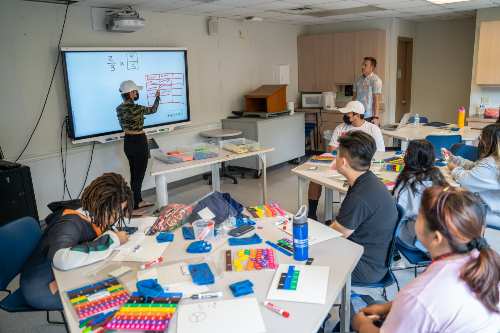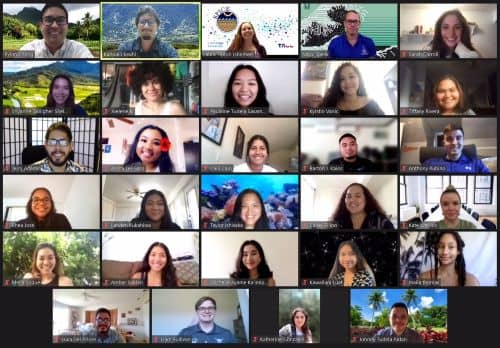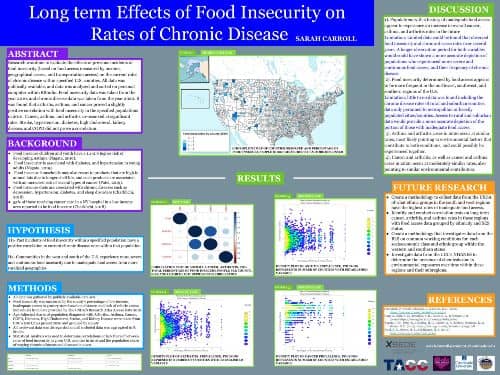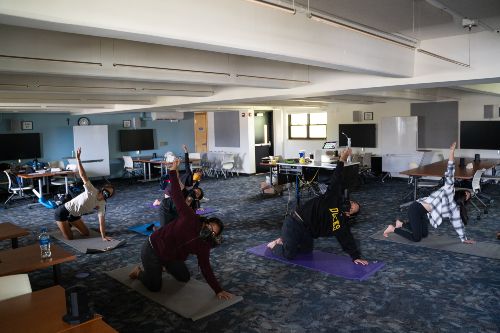“Cooking with Chemistry”
“Think Like a Champion”
“Psychology of Happiness”
Those might sound like great reads—or fascinating TED Talks.
But they were actually some of the engaging and hands-on courses offered at Chaminade University over the summer to groups of Hawaii high schoolers. The students were participants in Chaminade’s Summer Institutes, made possible at the university thanks to a partnership with the federal GEARUP program.
The workshops are designed to give high school students a taste of college—and get them hooked.
Participants this year for the seven, two-week sessions included ninth to 12th graders from Farrington, Kaimukī, Ānuenue and McKinley high schools. And in addition to going on field trips and tackling fun projects, they got the chance to attend co-curricular sessions on college readiness. The topics covered everything you’d need to know as you prepare to graduate from high school and plan for college, including applying for financial aid, navigating admissions and student life.
Pure Imagination
Aaron Williamson, assistant professor of Accounting, taught a session called “The Successes of Pure Imagination: Business Development and Entrepreneurial Mentorship.” He said the course was designed as “an immersion into the world of entrepreneurship”—from business plan development, brainstorming sessions, strategic thinking skills-building and the application of “principles of success” in daily life.
“The entire process of teaching the course was memorable—from idea inception to business plan presentations,” he said. “Having a small part in assisting students to see how an idea can impact the world and developing theoretical businesses that will be on the streets of tomorrow is so enjoyable.”
Cooking with Chemistry

In Dr. Francis Sakai-Kawada’s “Cooking with Chemistry” course, students tie-dyed their lab coats to better understand the chemistry of dyes, made their own bars of soap as they explored the properties of saponification, and took chemistry into the kitchen to make butter, mayonnaise, boba and ice cream.
“The goal was develop activities that were hands-on and engaging,” he said. “We had the creative license and flexibility to tie underlying scientific and chemistry concepts to every activity. Our priority was to incorporate an element of fun. We wanted our students to see that so much of what we deal with in our daily life can be related to chemistry, from food to household cleaning products.”
Kawada added that students started the course a little shy, but slowly opened up.
And the highlight of the session: visiting the IL Gelato Factory to talk story with owner Dr. Dirk Koeppenkastrop (a fellow chemist), who discussed his path from a chemistry lab to studying the art and science of gelato in Italy and the “perfect ratio of ingredients” that goes into the sweet treat.
Psychology of Happiness

Dr. Abby Halston, an assistant professor of psychology at Chaminade and clinical director of the university’s Marriage and Family Counseling program, taught the “Psychology of Happiness” course—which incorporated everything from guided meditation and breathing to personal journaling.
Students also put together personal stress management plans, worked to identify their hopes and dreams for college and beyond, and participated in mock career development interviews. The group also got to go on a field trip to Beyond Monet, an immersive experience into the artist’s works.
“I wanted to create a fun and life-changing institute where high school students could gain deep personal insight into their psychological wellbeing while learning personal management skills that could be utilized throughout their lifespan,” Halston said. “We focused on understanding the keys to happiness … and the power of our mindset to achieving our hopes and dreams.”
She added, “I cannot wait until next summer’s institute!”
For the Love of Math

For the Summer Institutes course on “Creating Number Sense to Increase Love of Math,” Assistant Professor of Education Dr. Travis Mukina wasn’t just teaching math fundamentals, but un-teaching some bad math habits. “Most days consisted of mental math activities that forced students to view numbers in ways their elementary school teachers did not allow,” Mukina said. “We broke numbers apart, changed their values and accommodated for the change at the end of the problem.”
“Hands-on manipulatives were also used daily to allow students to visually see how the numbers were working with each other in multiple different strategies. Every activity ensured the students were learning from each other rather than from me. It was amazing to witness!” Mukina added.
He said one of the big takeaways for students was that math isn’t a set of rules and procedures to memorize, but about creativity and flexibility. Mukina also wanted participants to see how math can be used seamlessly in everyday life—and how even complicated things can be broken down.
“I feel so honored to be part of this summer institute,” he said.
Living Pono

For the “Living Pono” institute, School of Nursing and Health Professions Professors Dr. Jennifer Nafarrete and Dr. Edna Magpantay-Monroe covered a wide range of health topics—from nutrition to human anatomy and physiology to reproductive health. Along the way, students tried their hand at cooking, engaged in some friendly competition, and put together presentations to tackle big topics.
Magpantay-Monroe said students really enjoyed the concepts of emotional intelligence and mindfulness, and especially loved their field trip to Ho‘omaluhia Botanical Garden—where they were challenged to strengthen their ability to “notice” and “be with nature.”
“I really enjoyed being a source of information to these students—helping them realize self-care is important but they also need to be self-aware of what is happening around them,” she said. “Being with nature helped increase their capacity to be mindful and reduce their stressors.”
Nafarrete added she was also happy to give students actionable, healthy solutions they can use everyday—like recipes. “My thought process was to find fun ways to engage students into making conscious choices about their health while considering how it affects the environment,” she said.
Think Like a Champion

Dr. Guanlin Gao, associate professor of Economics at Chaminade and director of the Economic Education Center for Excellence, focused on personal finance literacy in her course, “Think Like a Champion.” She wanted students to walk away with a better understanding of how to handle money.
“We spent one day visiting a local financial institution to learn more about how they operate and contribute to managing personal finances,” Gao said. “We spent another day on a fun team competition that involved budgeting, shopping and cooking. We even played a game that was all about inflation.”
Gao said the point of all the exercises was to help students see how better (and smarter) financial decisions ultimately lead to happier lives. “Interacting with the students was my favorite part,” she said. “For many of them, our trip to a bank was the first time they’d seen an actual vault. During our cooking competition, they all made nutritious meals. The best part: they were so proud of themselves.”











